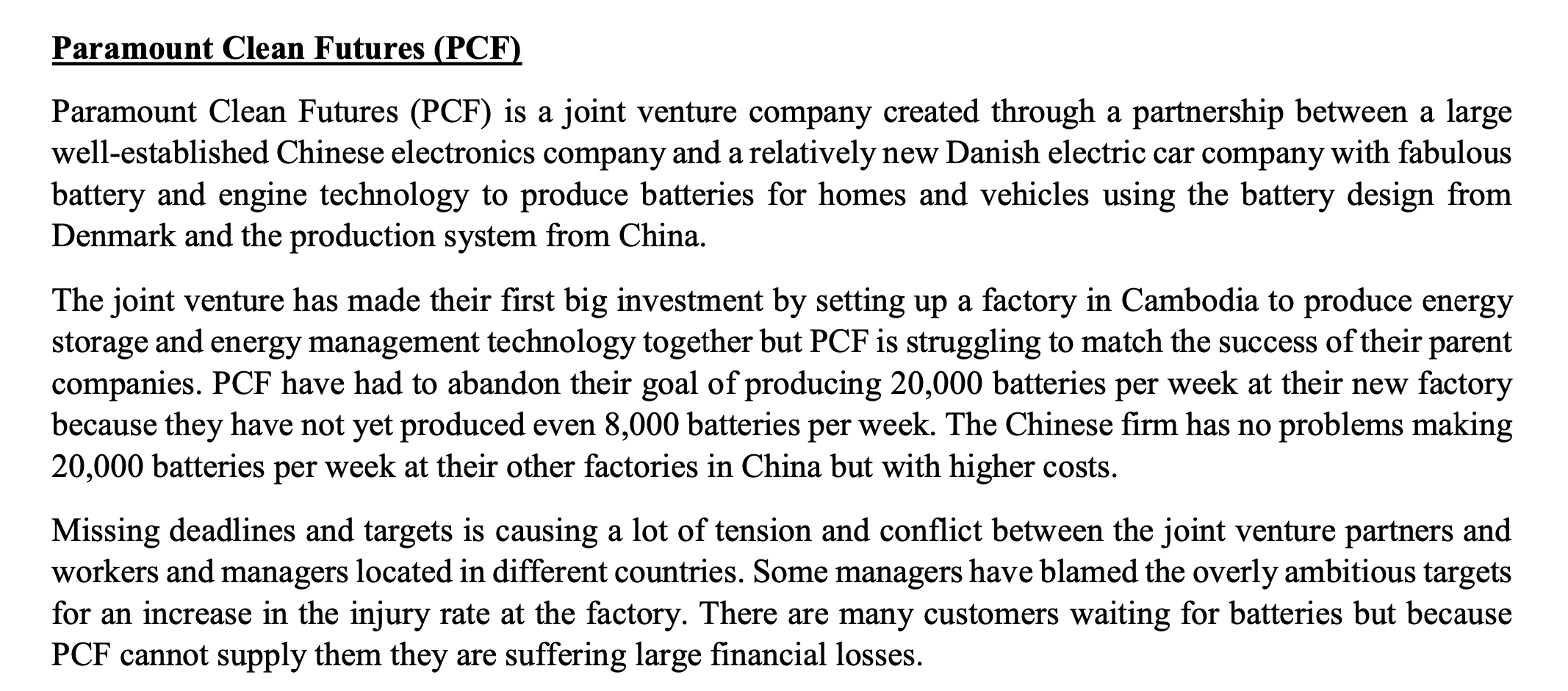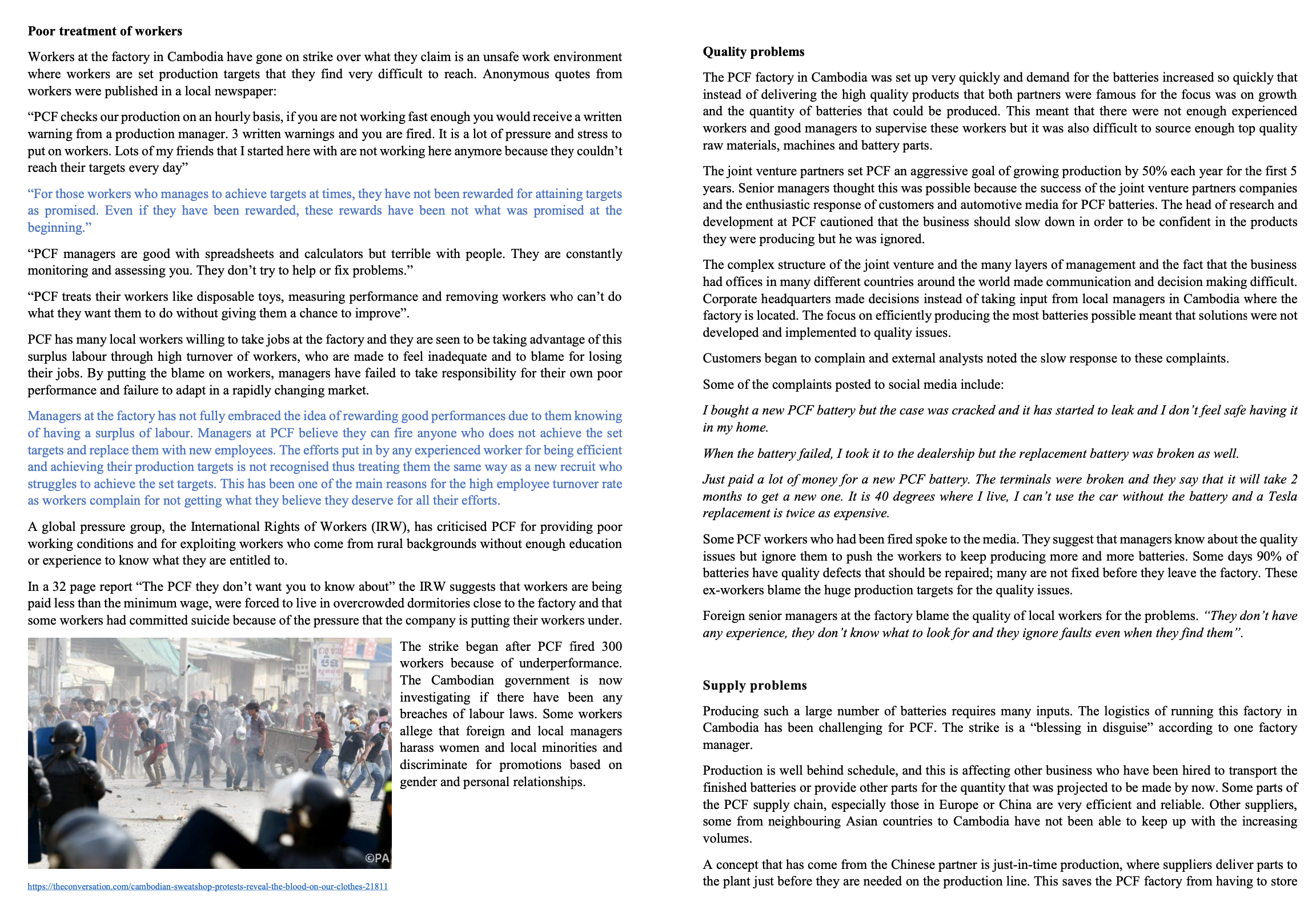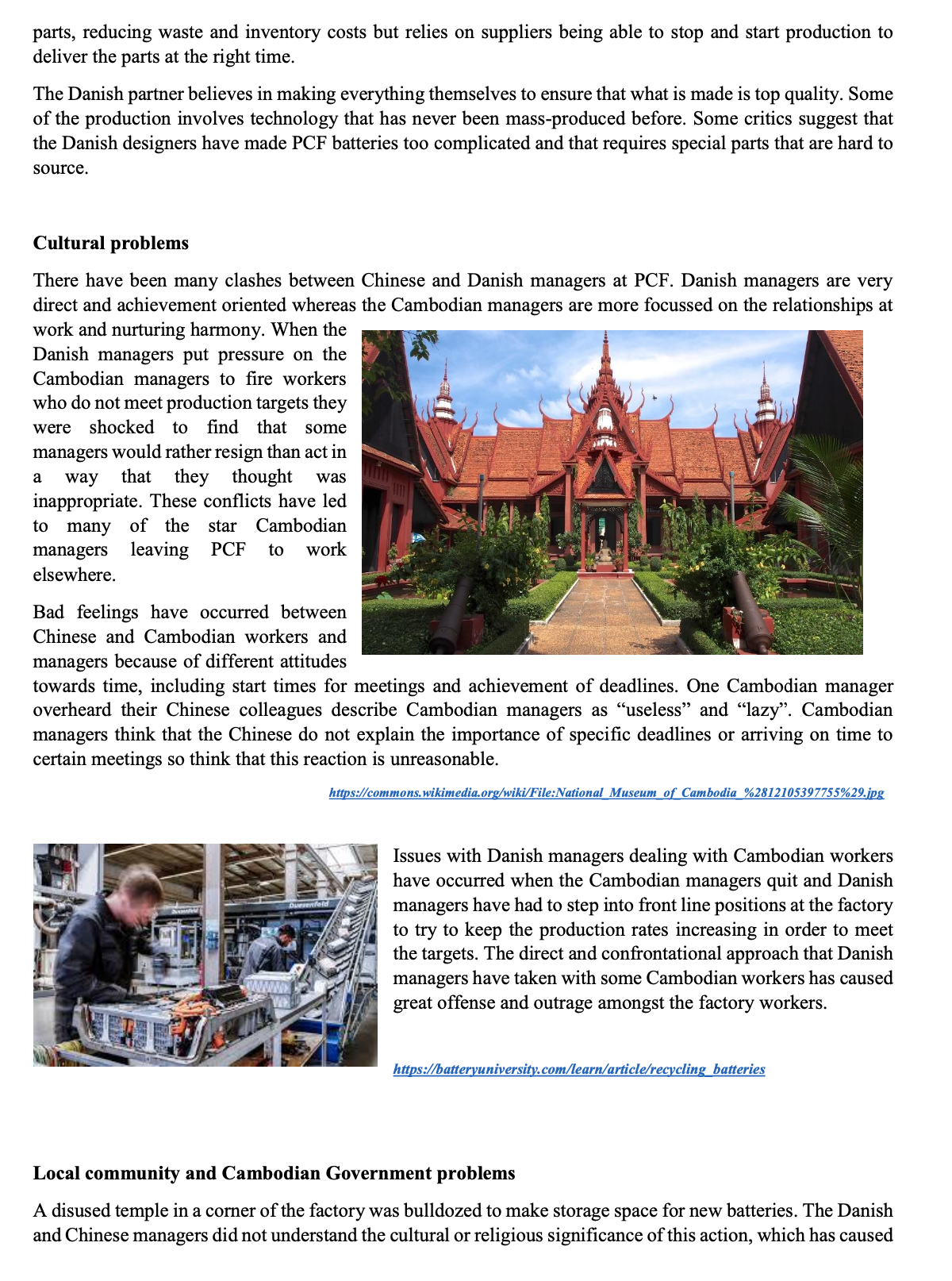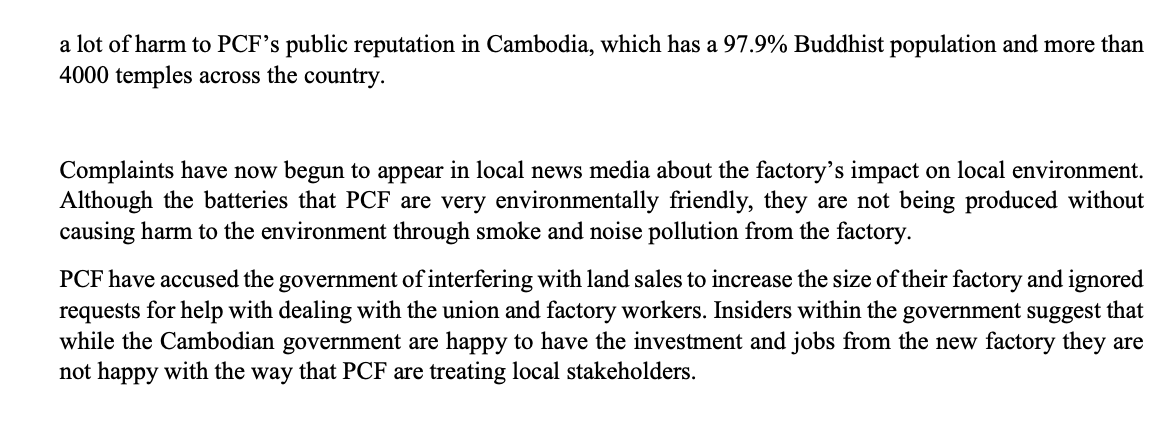Explain Scientific Management and Frederick Taylor's 4 Principles.
Explain how PCF is not effectively using 2 out of the 4 principles
from Fredrick Taylor's scientific management.
Paramount Clean Futures {PCF} Paramount Clean Futures G'CF) is a joint venture company created through a partnership between a large well-established Chinese electronics company and a relatively new Danish electric car company with fabulous battery and engine technology to produce batteries for homes and vehicles using the battery design om Denmark and the production system om China. The joint venture has made their rst big investment by setting up a factory in Cambodia to produce energy storage and energy management technology together but PCF is struggling to match the success of their parent companies. PCF have had to abandon their goal of producing 20,000 batteries per week at their new factory because they have not yet produced even 8,000 batteries per week. The Chinese rm has no problems making 20,000 batteries per week at their other factories in China but with higher costs. Missing deadlines and targets is causing a lot of tension and conict between the joint venture partners and workers and managers located in different countries. Some managers have blamed the overly ambitious targets for an increase in the injury rate at the factory. There are many customers waiting for batteries but because PCF cannot supply them they are suffering large nancial losses. Poor treatment of workers Workers at the factory in Cambodia have gone on strike over what they claim is an unsafe work environment where workers are set production targets that they nd very difficult to reach. Anonymous quotes from workers were published in a local newspaper: \"PCF checks our production on an hourly basis, if you are not working fast enough you would receive a written warning from a production manager. 3 written warnings and you are red. It is a lot of pressure and stress to put on workers. Lou of my friends that I started here with are not Working here anymore because they couldn't reach their targets every day\" \"For those workers who manages to achieve targets at times, they have not been rewarded for attaining targets as promised. Even if they have been rewarded, these rewards have been not what was promised at the beginning.\" \"PCF managers are good with spreadsheets and calculators but terrible vdth people. They are constantly monitoring and assessing you. They don't try to help or x problems.\" \"PCF treats their workers like disposable toys, measuring performance and removing workers who can't do what they want them to do without giving them a chance to improve\". PCF has many local workers willing to take jobs at the factory and they are seen to be taking advantage of this surplus labour through high turnover of workers, who are made to feel inadequate and to blame for losing their jobs. By putting the blame on workers, managers have failed to take responsibility for their own poor performance and failure to adapt in a rapidly changing market. Managers at the factory has not frilly embraced the idea of rewarding good performances due to them knowing of having a surplus of labour. Managers at PCF believe they can fire anyone who does not achieve the set targets and replace them with new employees. The efforts put in by any experienced worker for being efcient and achieving their production targets is not recognised thus treating them the same way as a new recruit who struggles to achieve the set targets. This has been one of the main reasons for the high employee turnover rate as workers complain for not getting what they believe they deserve for all their efforts. A global pressure group, the International Rights of Workers (IRW), has criticised PCF for providing poor working conditions and for exploiting workers who come from rural backgrounds without enough education or experience to lmow what they are entitled to. In a 32 page report \"The PCF they don't want you to know about" the ]RW suggests that workers are being paid less than the minimum wage, were forced to live in overcrowded dormitories close to the factory and that some workers had committed suicide because of the pressure that the company is putting their workers under. The strike began aer PCF red 300 workers because of under-performance. The Cambodian government is now investigating if there have been any breaches of labour laws. Some workers allege that foreign and local managers harass women and local minorities and discriminate for promotions based on gender and personal relationships. Quality problems The PCF factory in Cambodia was set up very quickly and demand for the batteries increased so quickly that instead of delivering the high quality products that both partners were famous for the focus was on growth and the quantity of batteries that could be produced. This meant that there were not enough experienced workers and good managers to supervise these workers but it was also difficult to source enough top quality raw materials, machines and battery parts. The joint venture partners set PCF an aggressive goal of growmg production by 50% each year for the rst 5 years. Senior managers thought this was possible because the success of the joint venture partners companies and the enthusiastic response of customers and automotive media for PCF batteries. The head of research and development at PCF cautioned that the business should slow down in order to be condent in the products they were producing but he was ignored. The complex structure of the joint venture and the many layers of management and the fact that the business had ofces in many different countries around the world made communication and decision making difcult. Corporate headquarters made decisions instead of taking input from local managers in Cambodia where the factory is located. The focus on efciently producing the most batteries possible meant that solutions were not developed and implemented to quality issues. Customers began to complain and external analysts noted the slow response to these complaints. Some of the complaints posted to social media include: I bought a new PCF battery but the case was cracked and it has started to leak and I don 't feel safe having it in my home. When the batteryfailed, I took it to the dealership but the replacement battery was broken as wellr Just paid a lot of money for a new PCF battery. The terminals were broken and they say that it will take 2 months to get a new one. It is 40 degrees where I live, I can't use the car without the battery and a Tesla replacement is twice as expensive. Some PCF workers who had been red spoke to the media. They suggest that managers know about the quality issues but ignore them to push the workers to keep producing more and more batteries. Some days 90% of batteries have quality defects that should be repaired; many are not xed before they leave the factory. These ex-workers blame the huge production targets for the quality issues. Foreign senior managers at the factory blame the quality of local workers for the problems. "They don 't have any experience, they don 't know what to look for and they ignore faults even when they find them \". Supply problems Producing such a large number of batteries requires many inputs. The logistics of mnning this factory in Cambodia has been challenging for PCF. The strike is a \"blessing in disguise\" according to one factory manager. Production is well behind schedule, and this is affecting other business who have been hired to transport the finished batteries or provide other parts for the quantity that was projected to be made by now. Some parts of the PCF supply chain, especially those in Europe or China are very efcient and reliable. Other suppliers, some from neighbouring Asian cornitries to Cambodia have not been able to keep up with the increasing volumes. A concept that has come from the Chinese partner is just-in-time production, where suppliers deliver parts to the plant just before they are needed on the production line. This saves the PCF factory from having to store parts, reducing waste and inventory costs but relies on suppliers being able to stop and start production to deliver the parts at the right time. The Danish partner believes in making everything themselves to ensure that what is made is top quality. Some of the production involves technology that has never been mass-produced before. Some critics suggest that the Danish designers have made PCF batteries too complicated and that requires special parts that are hard to source. Cultural problems There have been many clashes between Chinese and Danish managers at PCF. Danish managers are very direct and achievement oriented whereas the Cambodian managers are more focussed on the relationships at work and nurturing harmony. When the Danish managers put pressure on the Cambodian managers to fire workers who do not meet production targets they were shocked to find that some managers would rather resign than act in a way that they thought was inappropriate. These conflicts have led many of the star Cambodian managers leaving PCF to work elsewhere. Bad feelings have occurred between Chinese and Cambodian workers and managers because of different attitudes towards time, including start times for meetings and achievement of deadlines. One Cambodian manager overheard their Chinese colleagues describe Cambodian managers as "useless" and "lazy". Cambodian managers think that the Chinese do not explain the importance of specific deadlines or arriving on time to certain meetings so think that this reaction is unreasonable. https://commons. wikimedia.org/wiki/File:National Museum of Cambodia %2812105397755%29.jpg Issues with Danish managers dealing with Cambodian workers have occurred when the Cambodian managers quit and Danish managers have had to step into front line positions at the factory to try to keep the production rates increasing in order to meet the targets. The direct and confrontational approach that Danish managers have taken with some Cambodian workers has caused great offense and outrage amongst the factory workers. https://batteryuniversity.com/learn/article/recycling batteries Local community and Cambodian Government problems A disused temple in a corner of the factory was bulldozed to make storage space for new batteries. The Danish and Chinese managers did not understand the cultural or religious significance of this action, which has causeda lot of harm to PCF's public reputation in Cambodia, which has a 97.9% Buddhist population and more than 4000 temples across the country. Complaints have now begun to appear in local news media about the factory's impact on local environment. Although the batteries that PCF are very environmentally friendly, they are not being produced without causing harm to the environment through smoke and noise pollution from the factory. PCF have accused the government of interfering with land sales to increase the size of their factory and ignored requests for help with dealing with the union and factory workers. Insiders within the government suggest that while the Cambodian government are happy to have the investment and jobs from the new factory they are not happy with the way that PCF are treating local stakeholders










